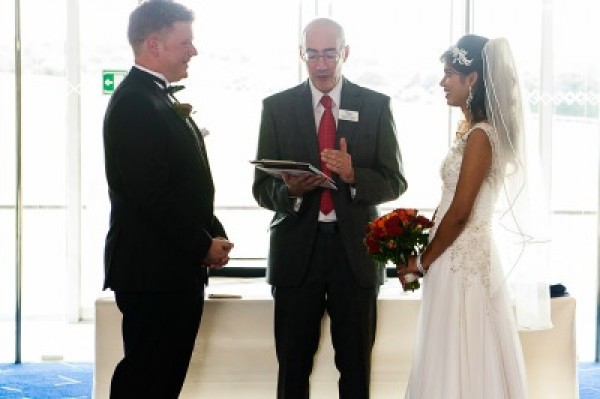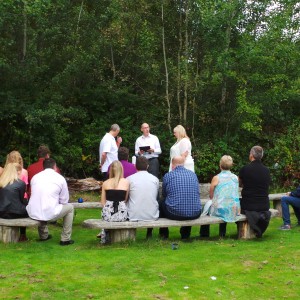
by Michael | Aug 3, 2020 | Blog
It would be nice, if I could offer a brief, succinct, clear update on the current situation as regards weddings. As with so many rulings currently, it’s just not as simple as that!
Legal Ceremonies
A Court very recently decided that humanists should be able to conduct legal weddings. It was felt that they had suffered discrimination and should now be free to proceed – but the decision would remain in the hands of the government.
A Law Commission review is due to be published next month. Part of that review is considering whether civil celebrants, in addition to humanists, can be allowed to conduct legal weddings.
This may seem relatively insignificant, but the proposed change should be for the better in the long run and offer couples greater choice.
Legal Weddings
There is a certain amount of confusion regarding the new announcement that weddings at venues are now allowed, but that there can be no reception.
It must be made clear that weddings conducted by civil celebrants are not currently classed as “legal”.
However, that doesn’t prevent you from holding a celebrant wedding ceremony! This needs to be part of the reception or party after the (legal!) wedding. How practical is this, I wonder, especially as it is unclear whether this is law or guidance?
My feeling is that it is probably best to wait until after 15th August to hold a gathering. The limit of 30 will still apply, but a service can then be held in an open space. This is dependent on there being only two family bubbles present. The civil celebrant counts as one bubble, and so would a photographer, say!
Could we have a situation where a photographer records the celebrant conducting a wedding for a couple who aren’t even allowed to be there?!
What a strange world we’re living in at the moment!
Anyway, I hope I’ve cleared all that up for you now …!
Photo: iandooley on Unsplash

by Michael | Mar 12, 2014 | Blog
Many people assume that a wedding needs to be held either in a religious building or in the register office. Well, those are not ideal for all, but fortunately there is the option of a civil celebrant .
As a lot of people don’t know that civil celebrants even exist, here’s some general information that should be useful.
Can a celebrant marry me legally?
The short answer, according to current English legislation, is no. However, there are two workable options to allow you to marry legally and also to enjoy the ceremony that you actually want.
1) you can have a registrar in attendance at the celebrant-led ceremony (provided the venue has the appropriate licence) or
2) you can marry legally (with 2 witnesses) at the Register Office the morning or day(s) before the ceremony. The celebrant can then conduct what to all intents and purposes is a full wedding or a wedding blessing ceremony (in the venue of your choice). That way, everything is covered.

What’s the difference between the Registrar’s and Celebrant’s ceremony?
The short answer is personalisation.
A registrar will keep to a script, without departing from it at all. The ceremony must contain no religious references. The time-slot is limited (there is usually a ‘conveyor-belt’ system in operation). You won’t normally have met the registrar who will be conducting your wedding.
None of the above applies to a civil celebrant. In addition to the personal and bespoke service that a celebrant offers, you also have freedom of choice of venue and even hour.
Would it be a humanist service?
It depends on the celebrant. A humanist, like the registrar, is not permitted to offer any religious content. A civil celebrant, like myself, can tailor the service absolutely according to your beliefs and wishes. I recently conducted a handfasting wedding, which was a fusion of paganism and Judaism! And it worked!
How are celebrants overseen?
Many celebrants belong to a body that has strict codes of ethics (I belong to UK Society of Celebrants, for example). These normally ensure that standards are being adhered to, although the celebrants I come into contact with are clearly professional, competent and trustworthy.
What about fees?
These will vary between celebrants and, obviously, need to take into account travel, possibly, board and lodging, and any unusual accessories requested.
The amount of work that will go into creating and performing a ceremony will depend on the type of ceremony required, so there’s no hard-and-fast rule. Personally, I usually give clients a firm quotation after our initial chat.
My fees include (virtually) unlimited contact with clients and as many revisions to the script as we need. Naturally, I conduct the service too. There are details of what is included on my website (www.vowsthatwow.co.uk) and I always send a clear summary in my Ts & Cs, once I have had the introductory chat with my clients.
What restrictions are there to the ceremony?
Beyond what I have already mentioned (especially on the legal side), as long as your requirements are within the realms of decency and reason, you can have what you want at your wedding.
- If you want to dance down the aisle or wear Superman outfits, you can!
- You can get married where you want (within reason) – that includes outdoors, of course, and could be in a hot-air balloon, say
- Your ceremony can include your choice of music, readings, rituals and participants
The idea is that we are working towards your big day. It should reflect your personality and be fun (where appropriate), meaningful and memorable.
That’s where a good celebrant comes in …
by Michael | Jan 28, 2014 | Blog
My spies tell me that the current talk over the “Coronation Street” sewing machines is about humanist funerals. Almost none of the characters know what is meant by this. Someone is able to explain that, essentially it will be a funeral service without any religion in it.
Surely you have to have a religious funeral?
The script-writers are right. Humanist funerals are an option. And, if it’s a true Humanist service, there can be no religious references whatsoever.
So, if you want a religious service, you go to your Church, Synagogue, Temple, Mosque etc. If you want no religion at all, you approach the Humanists. That’s clear enough, but might there also be people wanting something in between?
Is a compromise possible?
People often want something that includes references to God, even if it’s not the God of the conventional religions. Maybe they want a dash of religion (to placate a member of the family, to be ‘safe’ or because the deceased had some affection for one particular religion – or possibly, the deceased was part of a mixed marriage.). There can be many reasons for wanting a compromise service.
Celebrants
Fortunately, although not really in the public consciousness (until Friday?!), there are independent celebrants out there, whose main aim is to work with the client (next-of-kin usually) to create a service that absolutely reflects the wishes of the client (usually, respecting what the deceased would have wanted). In order to build a suitable service, celebrants will borrow from various traditions, suggest poems, readings, songs, hymns, rituals and participation by family or friends – whatever will make the ceremony meaningful and memorable.
The independent celebrant will strive to ensure that not only will there be an opportunity to grieve, but the life of the deceased will be celebrated.
Is this legal?
Just as you can choose the where, when and how, if you are celebrating a birth, as long as it is legally registered; just as you can marry where, when and how you choose, so long as the marriage is legally registered; so you can have the funeral that you choose, as long as the death is legally registered (and you dispose of the body according to regulations).
Why shouldn’t the funeral be just as you want it to be?
A little bird tells me that the “Corrie” funeral will be shown on Friday. I shall be interested to see how it is done, and, of course, whether I could have written and conducted it better!
Michael Gordon can help prepare and conduct a tailor-made life-cycle civil ceremony in or around London or, indeed, in Europe.



